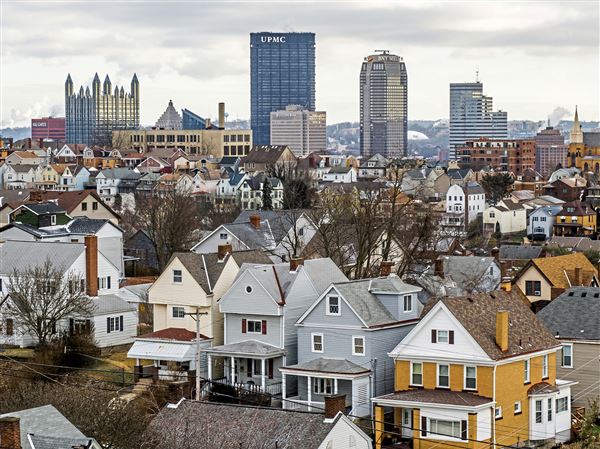Whether or not you're up on The Book of Ezra in the Old Testament, when Leslie Ezra Smith tears into the rhymed opening of his own "Book of Ezra," you feel the presence of a rabid prophet (think Jeremiah, Ezekiel or a Roman equivalent, Juvenal) who has been living on loco weed out in the desert and comes raving into the city to denounce evil.
Sadly, this contemporary black Ezra has plenty to denounce, starting with such recent killings as Michael Brown and Trayvon Martin. We share his pain, even though it can be hard to keep up with the speed and allusions in his passionate poetry. In contrast, in the original biblical book, the Jews return from Persian exile to rebuild the temple, and when that Ezra denounces their falling away from prescribed ways, they repent.
Where: Pittsburgh Playwrights Theatre, 3rd floor, 937 Liberty Ave., Cultural District.
When: 8 p.m. Friday and Saturday, 3 p.m. Sunday.
Tickets: $25; matinee $20; seniors or students $5 discount; 412-687-4686; www.pghplaywrights.com.
Mr. Smith's diatribe alludes less to that biblical repentance than to angry prophecy in general. But he too offers some hope. After his initial rant, he decelerates, then lovingly invokes his teenage son, Amaru Williams, and dedicates himself to assembling his own Book of Ezra out of the many manuscript memories and poems that litter the stage.
"Every boy deserves to know his daddy's story," he says, in a feeling epitome of his whole show.
That thought is also perfectly biblical, epic or just plain autobiographical. Like the Bible, Mr. Smith's "Book of Ezra" is a mix of biography, cautionary tales and rules for living. He tells us he only knows of his own father's life from his grandma, so in contrast, he sets out to assemble a Book of Ezra that he will give his son, who has just turned 15.
What follows are episodes from his life, loosely stitched together, ranging from melancholy to comic and sweet to terrifying: the abuse his mother suffered, the taunting of teachers, the first girl to give him her phone number, the devastation of the Challenger catastrophe, the inspiration of a fifth-grade music teacher and later of Malcolm X, the gang member who held a gun to his head ... it's a dizzying account of growing up black in the East End.
He also discovers Maya Angelou's poetry, which galvanizes him like August Wilson's first encounter with Bessie Smith.
Directed by Mark Clayton Southers, the show is enhanced by projections that range from old photographs to video sequences by Wali Jamal Abdullah that fill in the stories, right up to Mr. Smith's climactic meeting with his son, his newly compiled loose-leaf Book of Ezra under his arm. Lots of manuscript pages are left behind, scattered about, suggesting possible sequels to come.
At present, "Book of Ezra" is just over two hours plus a lengthy intermission. Mr. Smith may need that to catch his breath, but it would be better if it were 15 minutes shorter and without intermission. He may be working toward that, since this has the feeling of a workshop -- there are patches that ramble and in a few later segments he reads from his manuscript.
These shortcomings notwithstanding, "Book of Ezra" is compelling most of the way. Its chief appeal is the personality of the character/performer/author, a mix of angry, charming, vulnerable and defensive. As he says, perhaps as much to himself as to us, "If you don't go within, you will go without," and then, "once you do go within, you realize how much you can do without."
First Published: October 23, 2014, 4:00 a.m.















